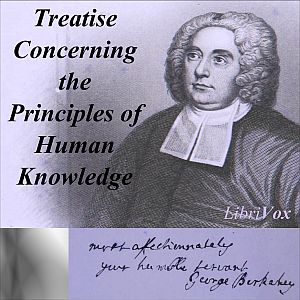A Treatise Concerning the Principles of Human Knowledge
A Treatise Concerning the Principles of Human Knowledge (Commonly called "Treatise" when referring to Berkeley's works) is a 1710 work by the Irish Empiricist philosopher George Berkeley. This book largely seeks to refute the claims made by his contemporary John Locke about the nature of human perception. Whilst, like all the Empiricist philosophers, both Locke and Berkeley agreed that there was an outside world, and it was this world which caused the ideas one has within one's mind, Berkeley sought to prove that the outside world was also composed solely of ideas. Berkeley did this by suggesting that "Ideas can only resemble Ideas" - the mental ideas that we possessed could only resemble other ideas (not physical objects) and thus the external world consisted not of physical form, but rather of ideas. This world was given logic and regularity by some other force, which Berkeley concluded was God.
Part 2 of the Treatise was never written. (Wikipedia)
Genre(s): *Non-fiction, Philosophy, Psychology
Language: English
| Section | Chapter | Reader | Time |
|---|---|---|---|
| Play 01 | Front Matter/Preface | Sue Anderson |
00:04:46 |
| Play 02 | Introduction | Hassan |
00:45:56 |
| Play 03 | Sections 1 to 14 | Sue Anderson |
00:19:32 |
| Play 04 | Sections 15 to 29 | Ian Lynch |
00:16:40 |
| Play 05 | Sections 30 to 44 | TalkyMeat |
00:18:07 |
| Play 06 | Sections 45 to 59 | Sagan Victoria |
00:20:51 |
| Play 07 | Sections 60 to 70 | Geoffrey Edwards |
00:14:33 |
| Play 08 | Sections 71 to 84 | Geoffrey Edwards |
00:15:29 |
| Play 09 | Sections 85 to 99 | Alan Shaw |
00:14:55 |
| Play 10 | Sections 100 to 114 | Craig Campbell |
00:22:05 |
| Play 11 | Sections 115 to 129 | Heather Hogan |
00:23:00 |
| Play 12 | Sections 130 to 144 | Sibella Denton |
00:15:54 |
| Play 13 | Sections 145 to 156 | Carl Manchester |
00:18:30 |
